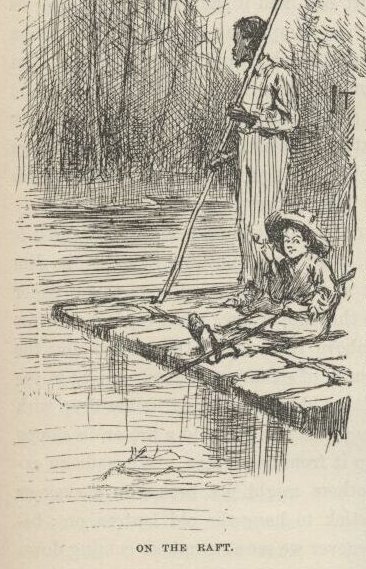
How much impact can images from a book like Huckleberry Finn have upon a reader? I’ve written about the importance of Huck’s courageous stand upon me as a young child, so I would answer, “ a tremendous impact.” But could there also be a negative impact? Could the docile and comic Jim undermine the self esteem of young black readers required to read the book in high school? Would they get the message, “This is how my teacher thinks I’m supposed to be?” Something like this, I believe, is behind the concerns that Paul Moses at the University of Chicago had about Twain’s novel (see previous entry).
In a moment I’m going to come to the defense of Jim. But let me say first that I think the book could have this negative impact if Jim were the only black literary character that students encountered. He may well have been the only black character in Chicago’s humanities curriculum at the time that Moses was teaching. But if he were just one of many—if Huckleberry Finn were taught alongside Baraka’s Dutchman and Baldwin’s “Sonny’s Blues” and Richard Wright’s Native Son and Toni Morrison’s Song of Solomon—then, I think, that readers could reach in and take their pick, choosing the images that would sustain them. Jim, in my mind, is a towering image of love, and his care for Huck and his love for his children (who have been sold away from him) far outweigh how he has been infantilized (whether by slavery or by the author). There may be black readers who need that image in their lives. But there are others who need to see their anger given voice (as it is in Native Son) or who need to step out of their drive for success and into their soulful side (as the older brother learns to do in “Sonny’s Blues) or who need to embark on an identity quest (as the protagonist of Song of Solomon does). Different readers have different needs, and one never knows as an author or teacher which work will reach out to which reader. So I think it is a terrible thing to ban a comic masterpiece like Huckleberry Finn and a terrible thing to teach only Huckleberry Finn. Better to make the controversy about it part of the lesson plan. Since race issues in America are still with us, despite the election of Barack Obama, a high school literature class discussion is one place where students can learn how to talk about them.
The problem with the literature culture wars as they occurred in the 1980’s and 1990’s was that they were exclusive rather than inclusive. The rallying cry of certain members of the right, “Austen, not Alice Walker,” operated on the premise of either/or. The assumption was that you either maintained standards or you cravenly surrendered to the forces of political correctness. But this was putting literature on a pedestal rather than seeing it as a living, breathing force that entered the lives of readers. What was not addressed (not really) was the needs of students. To force them to salute to “greatness” distorted the reading process.
Of course, the sad truth of the matter was that many students were reading neither/nor, regardless of what they were assigned. Sometimes it seems as though the culture wars were occurring in a vacuum, oblivious to the facts on the ground.
David Flood, a former student of mine at Leonardtown High School (in Leonardtown, Maryland) took what I think is the right approach and paired Huckleberry Finn with Song of Solomon—only to see the superintendent of schools intervene (following the complaint of a student and his mother) and disallow him to continue teaching the Morrison novel. This did, in fact, represent the kind of blindness that Moses feared. I will tell the story in tomorrow’s entry.


One Trackback
[…] written in the past about why I don’t think the book should be banned (here and here) and why I don’t believe that Twain was a racist. So I agree with what these people, many of […]